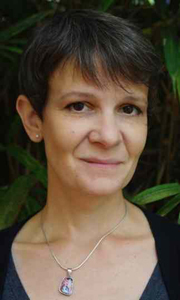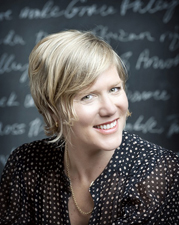A Certain Fearlessness: Christin Geall in Conversation with Alisa Gordaneer
 Local writer Christin Geall talks with Alisa Gordaneer, President of the Creative Nonfiction Collective Society, about memoir, the art of perception, and her role as moderator for Creative Nonfiction in Canada Today: Fact, Fiction, or Scandal?, one of three interactive panel discussions at this year's literary symposium, WordsThaw.
Local writer Christin Geall talks with Alisa Gordaneer, President of the Creative Nonfiction Collective Society, about memoir, the art of perception, and her role as moderator for Creative Nonfiction in Canada Today: Fact, Fiction, or Scandal?, one of three interactive panel discussions at this year's literary symposium, WordsThaw.
This panel will take place Saturday, March 19, 3:45 p.m. - 5:45 p.m., at the University of Victoria.
You’ll be moderating a panel at WordsThaw on the topic of creative nonfiction in Canada, featuring Christopher Gudgeon, Lynne Van Luven and Frances Backhouse. What do you predict will be the big issue?
The biggest issue is the new Malahat Review! So excited about this all-CNF issue, guest edited by panelist Lynne Van Luven. There’s a wealth of talent and diversity in the voices represented there—not to mention some thought-provoking stories, too.
Oh—you mean the big thing we’ll discuss at the panel? Possibly the ever-shifting question of how memory reflects different versions of reality, and the challenges of telling the “truth” when your perceptions of what happened vary. Either that or the perpetual question of fact versus fiction. Those come up frequently in discussions of CNF. How creative is that creative part, anyway? Writers wrestle with that question all the time.
You began your writing career in journalism at the Martlet, then Monday Magazine, and still work as an arts reporter. How do you feel about Christopher Gudgeon’s comment that “Fiction and non-fiction are not opposites… but points on a continuum”?
I think that comment ties into what I mentioned above, and I can see how it makes sense. Journalism relies on facts, which are verifiable and hopefully accurately represented, and I’d suggest it’s the furthest point on one end of that continuum, let’s say the left side. You can write all your life on that end of the continuum, reporting what happened and what people said, as accurately as possible. But there’s that “as possible” part. Once you start building in various perceptions, once you start bringing in your own perceptions, you’re taking a step along that continuum—as I do when I review theatre. My perception of a play isn’t necessarily the same as someone else’s, although the facts, such as who wrote the play or who acted in it, aren’t something you can change.
You recently were elected as President of the Creative Nonfiction Collective, a member-based organization that serves as Canada’s only creative nonfiction advocacy group. What’s the CNFC up to, politically?
Our main focus is to provide networking, education and inspiration for our members, through an annual conference. This year’s conference is taking place in Banff in April, and I’m looking forward to hearing from speakers like Camilla Gibb and Deni Bechard. The organization started out as a small, western-Canada group, simply by nature of its origins, but we’ve now got members from across Canada, and even some from other countries! Our next goal is to become a national society, and then to begin to develop Francophone membership as well—to that end, we plan to hold next year’s conference in Montreal.
UVic has launched a memoir workshop this year and I feel fortunate to be teaching it. What’s your take on the status of the memoir in Canada? I tend to believe we aren’t as self-disclosing as writers in the UK or US, and tend to prefer the autobiography over the memoir. Do you think that’s changing?
Are Canadians more reticent than Americans? Or than Brits? It’s hard to generalize, given the diversity of Canada and all the writers here. I think Canadians bring their own unique sensibilities to their work, and this genre is no different. Some of us are more excited to lay ourselves bare than others, and they build a path for those of us who might be more hesitant to do so. The more of us who take those chances, though, the more of us will feel emboldened to do so. For example, one of our conference guests this year is Elly Danica, the author of Don’t: A Woman’s Word. Published in 1989, it was one of the first memoirs written by a survivor of childhood sexual abuse, and it took tremendous courage at the time for her to write it. Not only was its content groundbreaking, but its form, written in fragments, was a new approach to memoir. I’m thrilled that she’ll be joining us in Banff to talk about how that book has made waves for her, for other survivors, and for memoirists as well.
You’ve taught at UVic, Camosun College and Royal Roads University. What do conferences and symposia offer to writers? Do you believe writing can be taught?
Sure, writing skills and techniques can be explained. But practicing writing, that’s up to writers to do for themselves—that’s what makes writers get good. That part is harder to teach, because it requires a great deal of butt-in-chair internal motivation. I could use a course in that myself!
However, conferences and symposia like WordsThaw offer some guidance for this learning, and hopefully more of that internal motivation. They also offer real-world connections, networking, community—there’s something magical about being in a room filled with other writers who are interested in the same topics you are, and something even more magical about realizing that writers whose work you admire are there, too.
The Creative Nonfiction Collective’s annual conference is a great example of how getting together with a group of like-minded writers is an ideal way to learn, spark new ideas, make new connections, and feel like you’re part of a community. This year we’re holding it at the Banff Centre, April 21-24, and I expect it to be inspiring to say the least.
Your family is creative: your mother a florist, your father and brother both visual artists, your daughter a bassist, and you yourself play violin. In what ways do you think of creative nonfiction as art?
I like to consider whether the artist wants to reflect reality, or to shape our perception of reality, or a combination of both. In CNF, it’s a bit of both. We’re doing our best to reflect what really happened, but we’re shaping perception because we’re the ones doing the telling, and while our own perception of reality is different than someone else’s, we’re the ones telling the story, so we shape how it’s perceived. In that way, yes, there’s art.
Creative nonfiction uses both the ‘eye’ to see the world and the ‘I’ to interpret it. Do you feel writing in the genre takes a certain bravado given that first person pronoun? Or rather, more humility?
A certain fearlessness is needed, for sure. Not only when you’re writing about what happened, but even more so when you’re writing about yourself. You’re facing your own ugly mug in the mirror of your words, and sometimes you just have to reflect that reality in order to maintain honesty and credibility. That’s where humility has to come in, because it means you can’t be afraid to come across as less fabulous than you’d like to think you are. You can then go on to shape others’ perceptions of that ugliness, though, so there’s the bravado rearing its head again. It’s a complex genre. No wonder it’s so compelling.
* * * * * * * *










